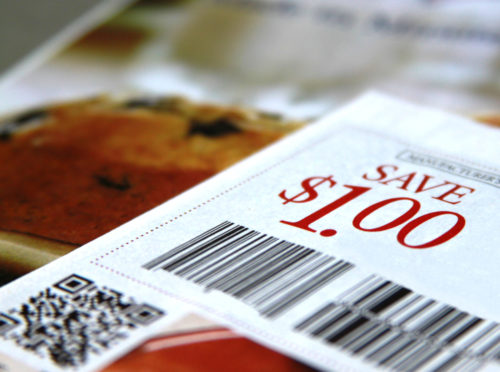Couponing is a budgeting practice that many people incorporate into their financial strategy to save money on the purchase of groceries, clothing, and many other items. Some people coupon casually as beginners, while others are extreme couponers, bringing stacks of coupons into the store to drive their total expenses down to next to nothing.
In some cases, people take couponing to other extremes, pushing the boundaries and redeeming coupons for more than they’re worth. Some people even counterfeit coupons, which almost always violate federal, state, and local laws.
According to the Coupon Information Center, coupon fraud occurs whenever:
- Someone intentionally uses a coupon for a product they have not purchased or without satisfying the terms and conditions for redemption.
- A retailer submits coupons for products they have not sold or that were not properly redeemed by a consumer.
- Coupons are altered or counterfeited.
Coupon glittering is another common type of fraud. Glittering is a colloquial term for glitching. This occurs when someone exploits an error in coupon scanning to use a high-value coupon for a product other than the one designated on the coupon. Coupon glittering is popular with coupons that use the Universal Product Code (UPC) format.
Coupon fraud can lead to criminal charges. If you shop on a personal budget and use coupons, take note of the tips below to avoid coupon fraud and protect yourself from accidentally using counterfeit coupons.
Table of Contents
Avoiding Unintentional Coupon Fraud
In some cases, people don’t realize they’re using counterfeit coupons and they end up involved in coupon fraud unintentionally. With an understanding of the guidelines and boundaries associated with using coupons, you’ll be better able to protect yourself from unintentional coupon fraud.
To remain a responsible couponer, familiarize yourself with some of the most common terms and conditions for using coupons, as well as the most popular ways that people use coupons fraudulently.
Coupons.com is a great reputable source that allows you to choose the active coupons you like, print them at home, then save money immediately at checkout.
Types of Coupon Fraud
There are a variety of ways that coupons can be manipulated, whether on purpose or by accident. Below are some of the most common types of coupon fraud.
Copying Coupons
It is against the law to make multiple copies of a coupon, and it is also outlined in the terms of service on the coupon itself. Normally, a store won’t allow photocopied coupons to be used, but they can slip through the cracks in some cases. To prevent coupon fraud, never use a copied coupon.
If you are using an online database to find printable coupons, you’ll see a limit to the number of times a coupon can be printed. Abide by those rules to prevent coupon fraud. Honey is a FREE smart shopping assistant that automatically applies discounts to your online cart.
Decoding Coupons
Coupons have very specific terms of use that require you to purchase a product of a certain size, color, or quantity. These terms are outlined on the coupon and you should follow them to receive a discount on the item specified in the coupon, not for any similar products.
Buying and Selling Coupons
Most coupons include “non-transferability” within the user agreement. This means the coupon isn’t valid once it has been transferred from one party to another. While it’s generally acceptable to pass a coupon along to friends and family, it is illegal to sell coupons for a profit. Avoid purchasing coupons from sites that offer them at a cost, as this is an illegal form of coupon fraud.
Stealing Newspapers or Coupon Inserts
While coupons are distributed for free, it is illegal to steal the newspapers and circulars they come in. Whether someone is stealing the entire paper or the coupon inserts themselves, this is a form of coupon fraud.
Retailer Coupon Fraud
Manufacturers will reimburse a store when a consumer using a coupon for their product, but only if the store submits the coupons in accordance with that manufacturer’s coupon policy. If a retailer submits coupons for products they haven’t sold or coupons that weren’t redeemed properly by a consumer purchasing a specific product, this is coupon fraud on the retailer’s part.
Effects of Coupon Fraud
While it might seem like coupon fraud saves you more money, in the long run, that isn’t the case. Coupon fraud affects the shopper most, as many retailers have to raise their prices to accommodate the losses they accumulate as a result of coupon fraud. To prevent stores from raising their prices, it’s best to abide by the policies associated with coupon use.
Moreover, participating in coupon fraud could result in legal action. This can cost you thousands of dollars in legal fees and result in a criminal record. Prevent yourself from getting involved in illegal coupon fraud by knowing how this fraud occurs and what you can do to help prevent it.
Spotting Fake Coupons
By actively looking for coupons, you can help preserve proper coupon usage and better understand what a real coupon looks like, making it easier to spot the fakes. To identify a fake coupon, be on the lookout for:
- “Free” item offers: While there are coupons for free items on new or small products, they are rare. If you see a coupon that offers a free item, it’s probably fake.
- The value of the coupon is high: A high-dollar amount on coupons should raise a red flag.
- Check the expiration: Authentic coupons will have an expiration date. If the coupon you’re using is missing an expiration date, it’s most likely a fraudulent coupon. Other missing information, such as no barcode, can also be an indicator that the coupon is fake.
- Confirm the source: Valid coupons will be offered by reputable sources such as retail stores or the manufacturer themselves. If you receive a coupon via email, check the source. Many scammers use email to trick consumers into clicking fraudulent links or using fake coupons. It’s important to check coupons you find in coupon apps, too.
- Go with your gut: If something seems off about the coupon, trust your instincts and don’t use it. There should be legal language, instructions for the retailer, and a valid barcode. If any of those items are missing, it’s most likely a fake coupon.
The Coupon Information Corporation maintains a database of fake coupons. If you’re unsure about the authenticity of a coupon, consult their site to check.
What to Do if You Discover Fake Coupons
If you find fake coupons, you should report them to prevent them from spreading or being used. The Coupon Information Corporation is surveying people who have found fake coupons on social media. In addition, there are a few institutions to which you can report fake coupons:
- Federal Trade Commission;
- Federal Bureau of Investigation;
- Internal Revenue Service;
- U.S. Postal Service: US Postal Inspection Service (USPIS);
It may seem harmless, but coupon fraud is a serious issue. If you think someone is distributing fake coupons, report them to the proper authorities right away.
What Are the Consequences of Coupon Fraud?
As mentioned previously, coupon fraud could cause stores to raise their prices to make up for the profits they’re losing because of fake coupons. More seriously, coupon fraud could result in jail time for the consumer, in addition to fines and legal fees. If you’re living on a tight budget, participating in coupon fraud might seem like you’re saving money now, but in the end, it could cost you more.
Living frugally and budgeting is a smart way to save money, but it’s important to be careful when couponing. Protect yourself as a consumer by knowing how to spot coupon fraud and where to report fake coupons should you come across them.
Image Source: https://depositphotos.com/






